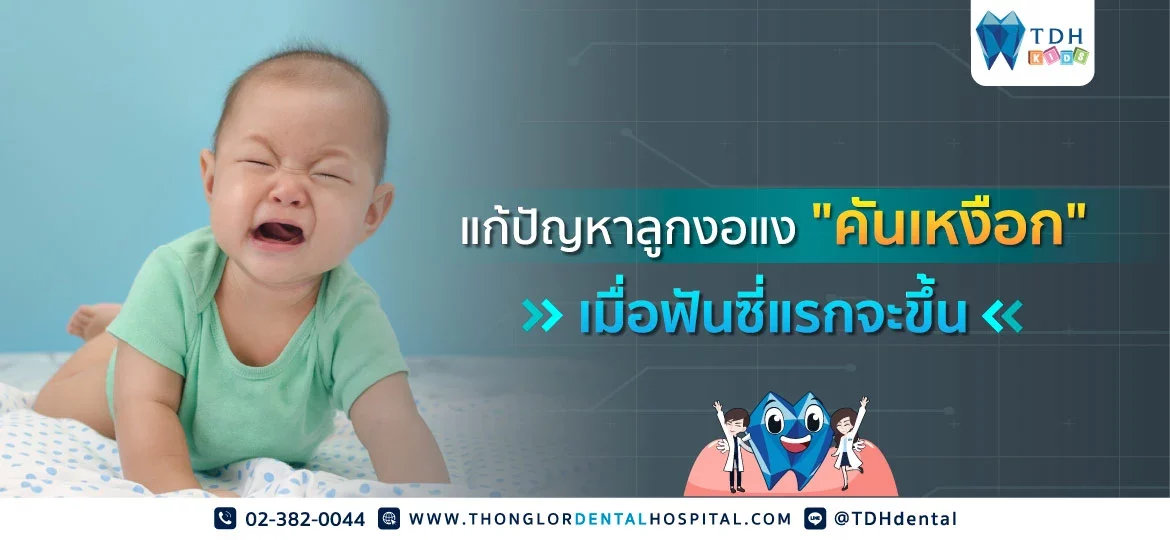When the first baby tooth comes in, your baby often has itchy or sore gums, which is normal for all babies. However, many parents may be worried and do not know how to handle it because their little ones often cry all the time, cannot sleep, or put things in their mouths to bite all the time, making parents worry whether their little ones are okay or not… Today, TDH Dental will share techniques for dealing with itchy gums because the first tooth comes in for new parents to apply.
When does your baby start to have teeth?
Normally, our babies will start to have their first tooth at 6 months old, which may be earlier or later, but usually no later than 12 months. Baby teeth will gradually come in until they are all in by around 3 years old. However, if your baby is 12 months old and still has no teeth, parents should take your baby to see a doctor to find the cause.
Itchy gums when teeth come in
When teeth are coming in, the edges of the teeth will gradually push the gums up, causing the baby to feel pain, itchy gums, red and swollen gums, or irritation in the mouth. This is a new feeling that babies are not used to. Many babies show signs of frustration and tantrums, especially when molars come in. Children may feel especially sore because they are the largest teeth. Parents can check by observing that their child’s gums are pale in color and when touched, they feel a hard lump pushing up, which is a sign that their child’s baby teeth are about to come in. In addition, there are other signs or symptoms that we can observe, such as:
- Your baby is cranky, irritable, or cries more than usual.
- Your baby drools all the time.
- Your baby wants to bite everything he sees and puts things close to his mouth, or sometimes bites his own fingers.
- Your baby will want to suckle more than usual from the breast or from a bottle, or the opposite, not wanting to suckle at all because his gums hurt.
- Your baby may have a poor appetite or insomnia.
Some babies may have a fever of no more than 38 degrees.
How to relieve itchy gums: What should parents do?
- Parents can massage their child’s gums using their own fingers or using a cloth soaked in cold water to gently massage the gums, as the cold will help numb the gums and reduce swelling.
- If your child feels itchy, parents can find a BPA-free teether or chew toy for your child to bite on. In addition to reducing itchy gums, chewing also helps to separate the gum tissue and makes it easier for the teeth to emerge.
- Another way to reduce swollen and red gums is to refrigerate toys, teethers, or pacifiers before giving them to your child to bite on. However, be careful not to refrigerate them too cold, as this can make your child’s gums even more sore.
- During this time, your child will likely drool a lot, so parents should frequently wipe and clean their child’s gums to prevent a rash on their face.
- If your child’s gums are very sore, you can gently rub a gel or powder on their gums to relieve the symptoms.
- If your child has severe gum pain, red, swollen, and inflamed gums, and has a fever, parents should take them to see a doctor, who may prescribe a pain reliever for children to help reduce the symptoms.
How to Help Your Baby When Teeth Come In
In addition to the above methods, parents should also do more to help their baby’s teeth grow smoothly, including:
- Let your child drink plenty of water to replace the saliva lost while teeth are growing.
- Clean your child’s mouth using gauze or a diaper soaked in cooled boiled water to wipe the gums, tongue, and cheeks twice a day to prevent gingivitis and for good oral health in the long term.
- When your child’s first tooth emerges from the gums, parents should take their child to see a dentist for a basic dental checkup and advice on how to properly care for their mouth.
For anyone interested in consulting about dental and oral health issues, you can make an appointment with the dentist at TDH Dental to discuss your oral health issues directly with the dentist. Just like that, taking care of your mouth and teeth will become easy and hassle-free.


 ไทย
ไทย